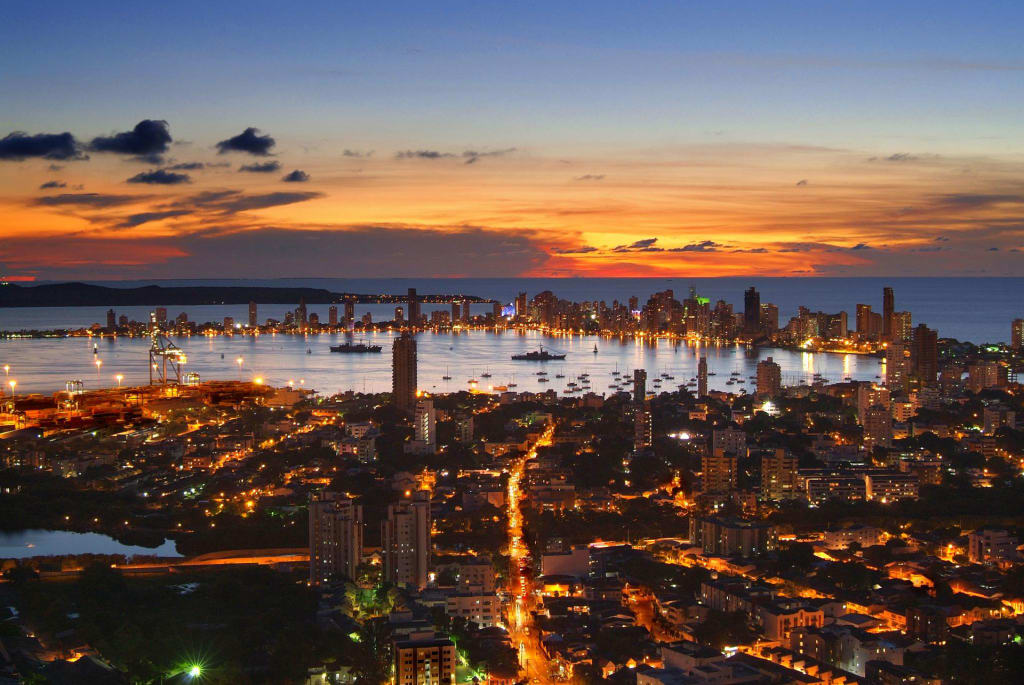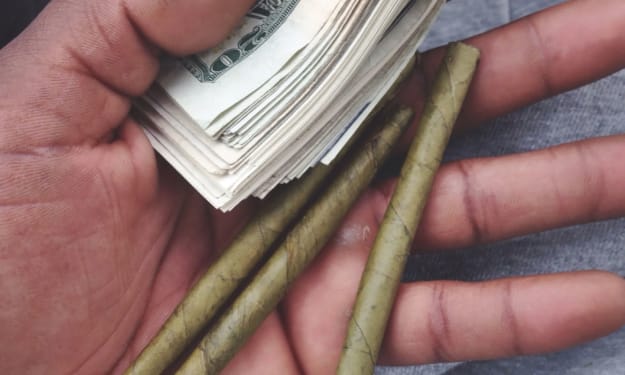Finding Marijuana in Colombia
I went to find marijuana in Colombia, half expecting to walk on to a 'Narcos' set, but what I found was more Miami then Cartagena.

There's a strange sensation of timelessness, seeing modern planes engulfed in a sea of museum relics in the Colombian airport. It's questionable whether or not these remnants from the past are capable of bouncing down the runway and soaring into the wild blue yonder.
Customs inspections are almost non-existent once you enter the country, since there is an age-old tradition in Colombia to let those who are financially well-off bring in as much contraband as they want. But going out, it is the complete opposite. People don't bring marijuana into Colombia.
Since a few porters, not all, but yes a few, looked like they were extras on Netflix's Narcos, I dragged my bags around with me while I tried to hail a taxi. I was nervous. Never been here before, and literally just finished Narcos season two. Not only were one or two porters menacing in appearance, but in some instances they would grab traveller's bags away from them to get a tip. Yes, they were only being helpful, but it was an aggressive helpful. While chattering loudly in a mixture of Spanish and pidgin English, sign language and animal grunts, they would try to get the owner of the bags to follow.
In this way, the porters were sure to make a nice tip, simply because I was willing to almost pay anything to get rid of my guy. My next problem was finding a taxi driver, forget the language barrier, the first few guy were going to charge me more than the flight, for a 30 minute drive. My driver ultimately was in harmony with that of the vehicle he operated. He was built on the short and stocky side, with a dark complexion, his hair slicked back almost to the point of being a second skin. His pencil thin mustache gave the impression that he had underworld connections or was an extra in Carlito's Way.
He offered to take me to the most exciting places the city had to offer. Girls, boys, men and women, drugs, gambling, anything I was interested in could be arranged. I told him that my only interest was to photograph some coastal scenes for my studies in oceanography. And any beautiful women I met. In hindsight that sounds like a much better trip, but this Colombia visit was part of my never ending research on the world of marijuana. I wanted to buy Marimba (pot) from the source. He suggested the beautiful beaches of Cartagena, where during my stay, I was able to contemplate and admire this nation's forbidden fruit and the most beautiful young women in the world. Not wanting to wind up on some cartel slab looking up, I did not wish to continue the conversation any further, I settled back and closed my eyes to fantasize about being on a beach full of sweet Colombian bodies and smoking pure Colombian.
I met with a local elderly official in the beach side town in Cartagena. I asked him about the local law enforcement of the marijuana trade. He could not tell me anything about what steps if any Colombia was taking to combat the cultivation of Marimba (pot), he was more than willing to talk about how he raids the sites where there is processing of cocaine.

He went on to inform me that at no time was I to take any pictures of government buildings, especially his. I would be subject to immediate arrest and all my photographic equipment confiscated. I found this very puzzling, since everyone knew the exact location of the building and did their best to avoid it.
Why no photos? He informed me, that a large percentage of its members are undercover agents in the field. If by some misfortune one of his agents was to appear in a picture while entering or leaving this building, his life wouldn't be worth much and his usefulness would immediately end. That held true for him, since he had refused to give me his name and allow me to capture his grandfatherly look for posterity for the American press.
I told him that the tourists are snapping photos every day with their iPhones, but again I was talking to a man who claimed to have hunted Pablo Escobar. What is so vital to your work and national security that you should remain a man of mystery?' I asked him. When he heard this question he almost jumped out of his seat and suggested that I go and talk to the General in charge of his brigade, who would be able to answer all my questions.
Outside his office I decided to photograph the building just for the hell of it. One of the guards offered to take a picture of me in front. I then had another soldier take a picture of both of us.
I decided to head to his General's office. His building was like an old WWII movie set. I asked for the General. Instead I was ordered to follow two soldiers, armed to the teeth, while four others fell in behind me leveling their rifles at my unprotected back.
I was led to the General's outer office, after having stated my reason for being there at the information desk on the ground floor. The General's aide asked me to have a seat.
I started eavesdropping on a father and son engaged in a rapid, heated discussion. The son seemed to be expressing his doubts about their being able to secure a certain permit they required. The old man gave a broad smile and assured him that everything had already been arranged, his life savings having been used to bribe the necessary people to obtain the permit. At this precise moment the general's aide came back, putting an abrupt stop to this very informative conversation.
The general informed me I could not be given any information without written permission from the Minister of Defense. Needless to say, I never managed to get this permission, since it was necessary that I spend a large portion of my time dealing with bureaucratic red tape.
The reality of the situation on the ground in Colombia, is that the elements of the present enforcement agencies overseeing drug enforcement turn a blind eye toward marijuana smokers and small time dealing. Colombia is nothing like it was in Netflix's 1980s Narcos. I highly recommend the beaches and the night scene. You will find an ample amount of information on the ongoing efforts of the Colombian government fighting the drug cartels. But I can tell you first hand that not a single official would discuss marijuana with me and not a single person on the beach didn't smoke local weed with me.
Governments in power are taking a lead from the US and moving drug enforcement resources to hard drugs in general. There have been instances of military troops actually participating in the guarding and loading of pot aboard airplanes for transport and sale out of the country. But marijuana was not hard to find and nor were really interesting people enjoying vibrant careers and lives in a country that as recently as the turn of the century, conventional wisdom had it that the tropical, Andean nation was on the verge of becoming a failed state. Fast forward to the present day and Colombia already boasts one of the region’s stronger tech startup ecosystems, with huge potential upside still waiting to be explored. It follows that a stronger internal tech culture will also form the groundwork for Colombia’s own aspirations in the field of innovation. Until then enjoy the new Colombia and the oldie but goody Marimba.
All this is to say that if you're in the market for some THC or CBD, there are easier ways to get it than going to Colombia. Personally I like to get my CBD oils online. As for weed, it's medicinal.
About the Creator
Randy Cobern
Retired old time drug entrepreneur. Current barista and avid reader.






Comments
There are no comments for this story
Be the first to respond and start the conversation.